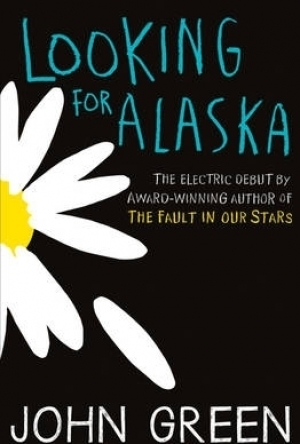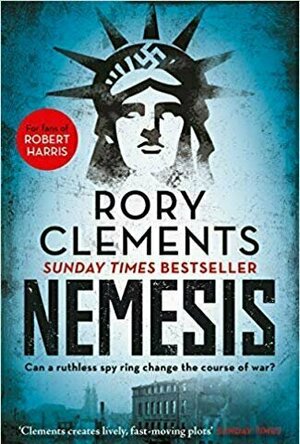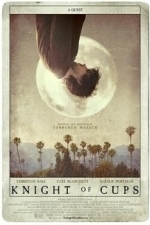Ivana A. | Diary of Difference (1171 KP) rated Looking for Alaska in Books
Feb 3, 2020
<img src="https://diaryofdifference.com/wp-content/uploads/2019/08/Book-Review-Banner-15.png"/>;
Miles is moving to Alabama to attend a boarding school. And while he is a quiet boy that happens to remember famous people's last words, he is also looking to stay out of trouble. He meets, incidentally, the most troublesome people that are about to change his life forever.
<b><i>''So, I walked back to my room and collapsed on the bottom bun, thinking that if people were rain, I was drizzle and she was a hurricane.''</i></b>
One of these people is Alaska Young, and believe me when I say, she is trouble. She is also clever and beautiful, but most of all screwed up, and she steals Miles's heart straight away.
''Looking for Alaska'' reminded me so much of ''The Perks of Being a Wallflower''. There was definitely the same vibe of boy goes to new school, boy is quiet, boy meets loud friends and boy falls in love.
And even though I got really annoyed at the beginning due to the fact that Miles barely talks to his friends and does whatever he is told to do, his character does develop throughout the book and he manages to find his voice and his purpose which I believe made this book way more meaningful.
<b><i>''That is the fear. I have lost something important, and I cannot find it, and I need it. It is fear like if someone lost his glasses and went to the glasses store and they told him that the world had run out of glasses and he would just have to do without.''</i></b>
On the subject of his feelings towards Alaska, the love he feels, it is very hard to actually notice the big impact she has on Miles. Yes, we might agree that she didn't really care about him as we would've wanted her to do. She didn't have big feelings for him, but she did have an enormous influence on him. While she was there thinking about her boyfriend, Miles was constantly thinking about her, memorising every opinion she has, learning all her favourite book titles, listening to all of her stories and always wondering whether she maybe, just maybe feels at least a fraction of what he feels for her. And while Alaska might not be aware, Miles will still carry all his emotions in his heart. Even if they have never been returned back.
<b><i>''What the hell is instant? Nothing is instant. Instant rice takes five minutes, instant pudding an hour. I doubt that an instant of blinding pain feels particularly instantaneous.''</i></b>
The book perfectly captures a young person's way of thinking and a young person's perception of feelings, actions, and responsibility into the unfair thing we call life. I recommend it to all of you!
<a href="https://diaryofdifference.com/">Blog</a>; | <a href="https://www.facebook.com/diaryofdifference/">Facebook</a>; | <a href="https://twitter.com/DiaryDifference">Twitter</a>; | <a href="https://www.instagram.com/diaryofdifference/">Instagram</a>; | <a href="https://www.pinterest.co.uk/diaryofdifference/pins/">Pinterest</a>;
Ivana A. | Diary of Difference (1171 KP) rated Nemesis in Books
Feb 3, 2020
<b>The Tom Wilde Series</b>
#1 <a href="https://www.goodreads.com/review/show/2780335366">Corpus</a>; - Not Read Yet
#2 <a href="https://www.goodreads.com/review/show/2780335377">Nucleus</a>; - Not Read Yet
#3 <a href="https://www.goodreads.com/review/show/2664038091">Nemesis</a>; - ★★★★★
<img src="https://diaryofdifference.com/wp-content/uploads/2019/04/New-blog-banner-13.png"/>;
<b><i>Nemesis is the third book from the Tom Wilde series by Rory Clements. I haven't read the previous two books, and I also haven't read any books from Rory Clements before. I received this book through ReadersFirst, and I will be honest, I was quite reluctant to read it. You already know my opinion on reading sequels before reading the previous books - but I went in blind in this book.</i></b>
The blue cover is simply gorgeous and I knew it was a thriller and a mystery, so I decided this was enough to get me going. If this book review ever captures your attention, I advise you to also go in blind. I think going blind made me enjoy this book even more.The fact that this is a third book in a series doesn't mean anything. The only similarity with the other books is the main character. Almost the same basis as Dan Brown's series and his professor Robert Langdon. The books are entirely standalones.
It is very hard to reveal what the plot is about without spoiling the fun. Tom Wilde is a university professor and one of his very talented students, Marcus, has left to join the International Brigades in Spain. Now, two years after, he is in trouble, and Tom helps him come home.
Meanwhile, numerous things happen, involving World War 2 Politics and propaganda, and in these times, no one knows who to trust. And when Tom Wilde finds himself in great danger, who will help him? And who does he needs to be afraid from? Has maybe helping Marcus been his greatest mistake?
Nemesis is full of suspense from the very first chapter, and the thing I loved the most about it was that the chapters are quite short, and always leave you hanging, hungry to find out more. Every word that Rory Clements types had a meaning and a purpose in this book, and that was the bit I admired the most.
The time setting revolves around the Second World War - a subject I don't often read about. I can't judge about the historical fiction element. However I do know that while I am a person that doesn't enjoy war books, this one struck me in a nice way. The war setting was very well written, and you could even feel the atmosphere around it. The ending was pleasantly surprising and it involved a mystery I could simply not resist.
<b>I will definitely read more books by Rory Clements, as I really enjoy the writing. If you enjoy thrillers and if you are a fan of Dan Brown, you will probably enjoy Nemesis a lot!</b>
<a href="https://diaryofdifference.com/">Blog</a>; | <a href="https://www.facebook.com/diaryofdifference/">Facebook</a>; | <a href="https://twitter.com/DiaryDifference">Twitter</a>; | <a href="https://www.instagram.com/diaryofdifference/">Instagram</a>; | <a href="https://www.pinterest.co.uk/diaryofdifference/pins/">Pinterest</a>;
Emma @ The Movies (1786 KP) rated Sonic the Hedgehog (2020) in Movies
Mar 1, 2020
Sonic is an excitable little fellow and he can't help but zip around his planet constantly against orders, when his speedy secret is uncovered he's sent to Earth and told to find a safe place to hide. He eventually finds a town to settle in and makes himself at home in the woods away from the people, but it's lonely watching the locals without being able to make friends with them.
When Sonic accidentally exposes his existence he enlists the help of the local sheriff so he might have a chance of evading a government scientist sent to track him down.
Simply said, this is an enjoyable film and it certainly went down well with the kids in the audience... but I'm not sure it would hold up to repeated viewings.
For all the moments I enjoyed there were moments that made my eyes roll. You remember in X-Men where Quicksilver runs fast and moves everything around in an action sequence? Well, you'll be wondering if Sonic happened to watch that one movie night. Sure it's cute, but I don't think it's cute enough to see it more than once in the same film.
Despite that, the effects themselves aren't bad, there are a few moments where real life and animation look a little off together but on the whole it works.
Sonic is an adorable hyperactive kid and he manages to experience a lot of things in the space of the film, they play out well and not at all like he's been stalking an entire town for years.
James Marsden plays Sheriff Tom. Watching him in any film after X-Men is extremely strange to me, and none of the roles seem quite right, potentially I just don't appreciate his comedic value. Tom's character is and a little average, it wasn't bad but at no point did I make a note about something that stood out.
And so to Jim Carrey... I enjoy Carrey as an actor but I'd like to seem him in more things that weren't "90s him". Every scene with Robotnik is classic Carrey, the character is that crazed scientist stereotype but it just never seemed to let up. It feels like they just brought him in to do what everyone expects him to do, and for a while I was okay with that... until that one point. As Robotnik searches for Sonic he waits for some analysis from the computer and he puts on his playlist. Then, for an inexplicably long time, he dances for absolutely no reason. It's not funny, it's just completely irrelevant and excessive. Rather than a subtle bit of nostalgia for the adults and some funny physical comedy for the kids every scene was taken just that step too far and turned into an awkward slapstick moment.
The story isn't bad, but perhaps it would have been slightly more interesting if Sonic had to rescue Tom from Robotnik or something similar. The middle of the film could have had some sort of purpose instead of a road trip... which, no matter how you look at it, was not necessary and could have been replaced with a minute of footage of Sonic running.
But... as I said at the beginning, this IS enjoyable, but once you start thinking about things it starts to unravel.
Originally posted on: https://emmaatthemovies.blogspot.com/2020/03/sonic-hedgehog-movie-review.html
Gareth von Kallenbach (980 KP) rated Knight of Cups (2016) in Movies
Aug 6, 2019
‘Knight Of Cups’ is a romantic drama written and directed by Terrence Malick and stars an ensemble cast including Christian Bale, Cate Blanchett, Antonio Banderas, Natalie Portman, Brian Dennehy, Armin Muller-Stahl, Isabel Lucas, Freida Pinto, Wes Bentley, Imogen Poots, Teresa Palmer, and Peter Matthiessen.
“Once there was a young prince whose father, the king of the East, sent him down into Egypt to find a pearl. But when the prince arrived, the people poured him a cup. Drinking it, he forgot he was the son of a king, forgot about the pearl and fell into a deep sleep.”
Rick (Bale) is a successful writer born into a powerful family in L.A. The son of Joseph (Dennehy) and brother to Barry (Bently). After the lose of a second brother as well as his mother, Rick becomes disillusioned and loses himself in the excesses found in the ‘City Of Angles’ and nearby Las Vegas. Along this aimless journey he encounters 6 different women Nancy (Blanchett) a doctor, Elizabeth (Portman) a married woman, Helen (Pinto), Isabel (Lucas), Karen (Palmer), and Della (Poots) looking to form some sort of bond or connection. Perhaps even to discover love only to encounter more lose. He wanders from cities, to beaches, then from mountains to deserts. Searching for something meaningful, some purpose all the while trying to hold what remains of his family and his own sanity together and along the way encounters a cast of colorful characters who have their own ideas about life and their own views on how he should live his.
This film was pretty much Malick’s attempt at making an art film with a large budget and a star studded cast. That’s just the thing. He succeeded and it was just too much. From a technical standpoint, it was wonderfully directed with its landscapes and ‘not-the-norm’ angles and close-ups but it simultaneously took away from the people and the story. It was almost as though they were trying to combine a film on the Discovery Channel with a drama. The film was two minutes shy of 2 hours long. Had the director been able to shave 20 minutes from it, then I could see it given a limited run in major theaters. I have to give kudos to the actors and actresses who were on top of their game which made the film worth sitting through once. The film is rated R for scenes of violence, nudity, and language. If you’re enduring one of those days where you just need to disappear and NOT communicate with anyone for a while, go see this movie. It’s runtime and complexity will help take your mind off your troubles. I’d highly recommend though that you save the film for viewing at home. I’ll give this film 3 out of 5 stars.
Gareth von Kallenbach (980 KP) rated Foxcatcher (2014) in Movies
Aug 6, 2019
The film has already been received extremely well by critics and has been praised for the performances of Ruffalo, Tatum, and Carell as the three underwent complete character transformations. The film premiered in May at the Cannes Film Festival and director Bennett Miller took home the award for best director. As someone who has seen the film I can tell you that at first I didn’t recognize any of the three lead actors when their characters first appeared on screen in the movie. I would bet money on this film being nominated for Oscars, Emmys, and any other movie awards that I cannot imagine right now based on their performances alone. Channing Tatum has even been quoted as say that this was the hardest acting challenge he has had to date in his career.
In the course of the film, we see a unique look inside the mind of an Olympic athlete via Canning Tatum’s performance as Mark Schultz and how they start out as ‘pure’ and patriotic and how those athletes can be corrupted with the promise of big money for sponsorship or with the purpose of restoring and repeating the ‘glory and standing’ they experienced previously and how it reaches into their lives and the lives of the athlete’s families. Example, in the film when at coach John du Pont’s (Carell) insistence, Mark tries to convince his brother Dave (Ruffalo) to join him in putting together team ‘Foxcatcher’ to train wrestlers for the 1988 Seoul Olympics. At first, Dave declines for the reason of not wanting to uproot his family from their home. Later on though, when its of du Pont’s opinion that Mark’s efforts are unsatisfactory du Pont takes matters into his own hands and convinces Dave himself of signing on thereby alienating Mark from and then from his brother. Eventually, the brothers reconcile but this appears to enrage du Pont who’se already starting to display the symptoms associated with paranoid-schizophrenia. Which some say is the true culprit behind du Pont’s mixer of Dave Schultz.
I would personally give this film 4 out of 5 stars. Bennett Miller couldn’t have done a better job directing this film and once again, the performances by Tatum, Ruffalo, and Carell were amazing and I have no doubt that they will become major millstones in their careers. However, there is the obvious downside of knowing the outcome in this particular instance. Although I did indeed enjoy the film it was also for all intents and purposes, the film was basically a two hour march to death for the character of Dave Schultz which was a major bummer. But hey, that’s not the fault of anyone involved in the film. That’s just what happens when you watch a true crime story. That’s my only gripe in regards to the film though. I say go see it. It is a two hour film though so be sure you grab a meal and a few beverages before you hit the theater.
This is your friendly neighborhood freelance photographer ‘The CameraMan’ and on behalf of my fellows at ‘Skewed & Reviewed’ , thanks for reading … and we’ll see you at the movies!

iPharmacy - Pill ID & Rx Reminder
Medical and Health & Fitness
App
Identify your pills, find the lowest price for your Rx, understand your medication treatment, lower...

myPill® Birth Control Reminder
Medical and Health & Fitness
App
It makes sure you'll NEVER miss a pill ever again. With myPill® you can truly be free of worries....

Paramedic Academy: Flashcards, EKG, EMS Toolkit
Medical and Education
App
Paramedic Academy is a complete training guide for EMT-Paramedic level EMS personnel. This is an...

Birth Control Reminder myPill®
Medical and Health & Fitness
App
It makes sure you'll NEVER miss a pill ever again. With myPill® you can truly be free of worries....

iPharmacy - Drug Guide & Pill Identifier
Medical and Health & Fitness
App
Identify your pills, find the lowest price for your Rx, understand your medication treatment, lower...




